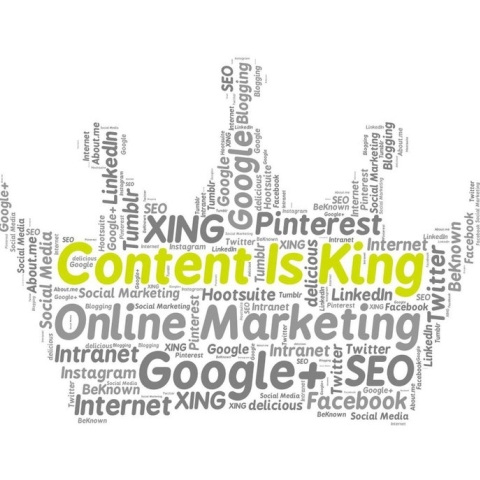Content Marketing Delivers on Corporate Event Goals

“Content is king!” The saying has become cliche because content marketing, still a relatively young marketing concept, has quickly become the go-to strategy of marketers in many industries. According to Forrester, U.S. marketers spent more than $10 billion on content marketing in 2016. Additionally, reports from Content Marketing Institute state that marketers increased their budgets in 2017 and plan to again throughout 2018. Beyond dollars, when used strategically, content marketing helps organizations get results.
Dax Callner, chief strategy officer at GES Events, said that content marketing, like any marketing channel or strategy, should positively impact the business outcomes of corporate events.
“That means [content marketing] should be driving opportunities to and accelerating the sales pipelines, positively impacting brand affinity and building loyalty with current customers,” Callner explained.
Corporate event planners can employ effective content marketing strategies during their events as well as between events.
"Optimizing attendee engagement between events at a destination meeting has never been more important for meeting planners,” said Karen Shackman, president of Shackman Associates New York.
“If you create engaging content, you avoid attendees going off into their own corners with their mobile phones between events. Delivering timely, on-topic messages and call-to-actions keep attendees motivated to connect to others,” she continued.
Establishing an effective content marketing campaign requires first establishing measurable goals.
Cindy Y. Lo, DMCP president and events strategist at Red Velvet Events, said that all stakeholders need to clearly define their goals.
“Are they wanting to increase sales of a particular product? Make an official announcement an impending product? Correct perception on an existing product?,” she asked.
Leigh Long, head of marketing at XD Agency, points out that effective content marketing can broaden the reach and extend the life of those conversations and that emotional resonance—amplifying the impact of an event.
“Among a plethora of potential purposes, event-related content marketing can drive future event attendance, showcase event materials to a broader audience, encourage user-generated content and audience engagement, facilitate mutually beneficial professional relationships, socialize thought leadership, and reinforce and elevate brand perceptions,” she stated.
Measurement is also a key component to establishing goals, enabling stakeholders to evaluate the success of each campaign and make modifications as needed.
“Individual pieces of digital content within a content strategy should be assigned distinct key performance indicators (KPIs) connected to content performance,” according to Callner.
“For example, ‘likes’, ‘comments’ or ‘shares’ should be defined across an array of social channels, noting that a piece of content is usually best suited to one and not all of these user actions,” he explained.
After goals are established, event planners should create a formal content strategy document, identifying the goals, audiences, tactics and messages that will be used.
“It’s easy to post content before, during, and after an event,” said Long.
She continued, “But that content only will deliver results if it tells an effective — and strategically developed — story. To that end, marketers must define what they’re trying to achieve with their content, and coalesce around the brand story they want to tell.”
Long advises planners to remember who their audience is and what they want attendees to take away from the event. What perceptions do you want to shift? What behaviors do you want to compel? Those considerations will inform the entire experience design.
One key consideration is matching the strategy, goals and tactics with the needs and interests of the audience.
“A corporate event content strategy must balance the demands of the corporation and the needs of the target audience,” said Callner.
He added, “Striking that balance can be a challenge but it is critical to event success. Event content must also deliver both intellectually and emotionally. Content planning should consider the "hearts and minds" of the target audience.”
Lo added that planners must ask themselves if their goals match the audience that is being invited to the event itself.
“For example, you shouldn’t have a live twitter feed wall for an audience that traditionally does not tweet,” she said. “It might be a cool setup, but what is the purpose if your audience doesn’t naturally tweet?”
Given corporate event planners’ already overloaded schedules, adding another time-consuming initiative can be daunting. To keep up with day-to-day content activities, proper planning is important.
“Well before it’s time to actually launch pre-event communications, determine what your narrative arc will be, define the content calendar and identify the resources needed,” said Long.
In addition to planning, use the human resources available strategically.
“Busy event planners should assign a single person [to manage] content efforts and empower that person to really run things, empowered to negotiate and make tough decisions; informed by a rich understanding of the business and audience needs; driven by a distinct and compelling point-of-view,” said Callner. “Content marketing by committee can be terribly inefficient, an event team really does need someone to own it.”
Depending on the resources available, consider breaking up the tasks.
“If possible, have two different people manage an event–one to manage content and the other to manage logistics, because you need two different types of brain power here,” Lo suggested.
Overall, content marketing can address a variety of planners’ goals, but ultimately, effective content strategies achieve the main function of corporate events—connecting people on a deeper level.


Add new comment